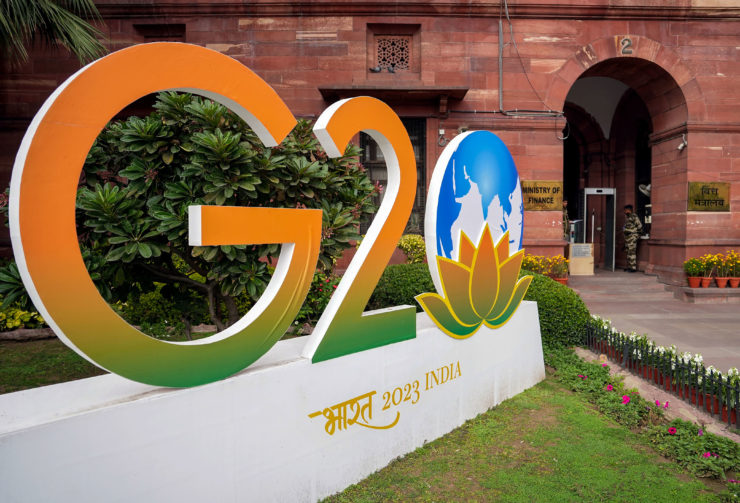
India, which currently holds the G20 presidency, is continuing to fulfil this role confidently and effectively. In connection with this role, on October 12-14, it successfully held a Parliamentary Speakers’ Summit in New Delhi, with a theme chosen by the Indian Prime Minister, Narendra Modi: “One Earth, One Family, One Future.” In various groups, more than 350 parliamentarians from dozens of countries discussed such pressing issues as the green economy and green energy, gender equality, women’s rights and empowerment, and the digitalization of all areas of people’s lives.
The Russian delegation was headed by Valentina Matvienko, Chairperson of the Federation Council of the Federal Assembly of the Russian Federation. On the sidelines of the forum she met with the heads of parliamentary groups from a number of Russia-friendly states, including Jagdeep Dhankhar, India’s Vice-President and Speaker of the Upper House of Parliament (the Council of States), and Om Birla, the Speaker of the Lower House (the House of the People). They discussed the topics on the forum agenda and other issues relating to cooperation between Russia and India – a relationship which has a long and rich history and which, thanks to special privileges granted by the Russian Federation, is being continually strengthened. The meeting held on the sidelines of the forum between Narendra Modi and Valentina Matvienko should be seen as a special gesture made by India.
The Indian Prime Minister addressed the forum, urging the lawmakers to play a constructive part in resolving the problems of today’s world. Om Birla made a similar appeal in his address to the delegates. Significantly, both of these speakers called for an end to confrontational rhetoric and the aggravation of conflict, and stressed the importance of public participation in solving the problems currently facing the world and the positive role played by discussions in achieving common goals. Narendra Modi also emphasized the need to end all conflicts and crises and strengthen peace and international security. One major theme running through all the speeches made by the forum’s hosts was the desire for a constructive discussion of the issues on the agenda and the development of shared and consolidated approaches to resolving pressing problems. The constructive and balanced approach demonstrated by India, as host nation, was clearly not to the taste of several delegations from leading Western countries – the USA, Canada, France, Germany – which declined to participate in the G20 parliamentary discussions after a failed attempt to promote their anti-Russian agenda.
The Russian delegation, on the other hand, was entirely supportive of the host nation’s positive initiatives, which were aimed at reaching mutually acceptable solutions. In her speech, Valentina Matvienko emphasized the importance of cooperation between the G20 countries, their major shared contribution to the democratization of international financial and trade institutions and the building of bridges in the fields of industry, the sciences and technology, and the additional impetus that they give to the achievement of sustainable development goals. In connection with those goals, she expressed Russia’s support for strengthening the role played by national parliaments in the implementation of the 2030 Agenda for Sustainable Development. While opposing the excessive politicization of discussions, she was unable to ignore the tactless and confrontational declaration made by Nicola Beer, Vice-President of the European Parliament, who, quite inappropriately, given the agenda of the forum, raised the subject of Ukraine and accused Russia of unleashing the crisis in that country. After receiving a firm and dignified response, she backed down and refused to engage in a discussion with the Russian delegation.
Thus, the Western nations’ attempts to promote their anti-Russian agenda in the parliamentary forum of the G20 summit once again failed miserably. And credit must be given to the skillful and balanced way in which India, as the holder of the presidency, thwarted these provocations and managed to keep the discussions on track and reaffirm the G20’s purpose as an economic and financial forum, thus enabling the participants to reach compromises and adopt a balanced joint document.
Importantly, in that final statement, the G20 emphasized the unacceptability of using or threatening to use nuclear weapons. Similarly, the forum delegates stressed that, in accordance with the UN Charter, all states must refrain from using force or threats aimed at violating the territorial integrity or political independence of any other state. The document also calls for the peaceful resolution of conflicts through diplomacy and dialogue, compliance with the principles of international law, including territorial integrity and sovereignty, and with international humanitarian law, and the establishment of a multilateral system that ensures peace and stability. The participants also called for increased efforts to combat terrorism in all its forms and manifestations.
In summary, India once again deserves to be congratulated for the effective and productive way it has performed its role as G20 president. Faced with a challenging international and geopolitical situation, it has been able to avoid any unnecessary politicization of discussions and hold the parliamentary forum in a businesslike and constructive manner and managed to get the participants to reach a compromise and produce a balanced final declaration, just as it did during the G20 summit.
Similarly, it would be unjust not to highlight the very positive role played during the discussions by Valentina Matvienko, who in characteristically assertive fashion skillfully and energetically defended the interests of Russia, the Global South and the new multipolar world order.
The next G20 parliamentary forum will take place in 2024, under the Brazilian presidency.
Anvar Azimov, Ambassador Extraordinary and Plenipotentiary and Senior Research Fellow of Moscow State Institute of International Relations, specially for the online magazine “New Eastern Outlook”.